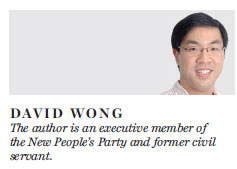The SAR must choose an affordable pension plan
Updated: 2016-03-29 08:43
By David Wong(HK Edition)
|
|||||||
The issue of a universal pension scheme has been hotly debated in Hong Kong since as early as the 1990s. The proponents of the scheme hoped that it would help alleviate elderly poverty once and for all and reassure an aging population that they need not worry about retirement. However, the government and many in the community fear that the costs of the scheme will be prohibitive and unsustainable. Therefore, the government has long been reluctant to formulate an official proposal on how to implement such a scheme. It was not until this administration that a formal consultation was carried out as it was included in Chief Executive Leung Chun-ying's election platform. Late last year, the government began a six-month consultation period with two specific proposals: The first one says all elderly aged 65 and above should receive a monthly public pension of over HK$3,000 per month; and the second one requires recipients to undergo means testing.
Lots of people, including myself, strongly believe that public resources should be focused on helping those who are most in need, since it would allow the underprivileged to receive more public assistance as well as allocate taxpayers' money more effectively. In other words, even if society as a whole could somehow afford a generous universal pension scheme, it would be unwise to do so as it would be a waste of public resources. This is a fundamental principle in public administration and finance. While certainly not everyone agrees with this evaluation, there was no in-depth discussion in the community on its pros and cons, nor were there many opinion survey exploring this line of thinking.
Without settling this basic question, it would be hard to further discuss the issue. Therefore, the public debate in the past months has lacked a real focus, with different interest groups chanting slogans and presenting half-truths at town hall meetings and seminars. For example, one of the most commonly raised arguments was to question why the government could afford multi-billion-dollar infrastructure projects but was unwilling to set aside a start-up fund for the universal pension scheme. Obviously, the opposition camp - with its usual anti-mainland stance - always has been critical of the high-speed rail project and the Hong Kong-Zhuhai-Macao Bridge. Setting political bias aside, it is understandable that the public are disappointed as these public works projects have had to be delayed and have incurred cost overruns. However, it should be noted that they only involve one-off expenditure and are clearly beneficial to Hong Kong's development in the long run. In addition to the principle of focusing resources on those who need it most, it would be illogical to put different public expenses at odds with each other. Hong Kong spends billions of dollars on universal and compulsory education for children every year; would anyone dare to complain that the government is willing to spend on children's education but not on retirement funds?
Another point of contention is the reliability of the statistical projections. Since a universal pension scheme affects all generations of the community, the government has to assess whether it is sustainable in the decades to come. Therefore, the consultation paper outlines a 50-year projection, involving changes in the working population, the number of retirees, economic growth and inflation, and so on. Clearly, there are margins of error in such a long-term projection and the final results are unlikely to be entirely accurate. Nonetheless, common sense would dictate that an aging population with a shrinking workforce could not possibly afford universal pension without significantly increasing tax revenue. One should wonder whether it is moral to increase the tax burden on the younger generations just to afford pension payments to wealthy seniors who really do not need the money. Moreover, the total public expenditure projected over the decades of a universal pension scheme is around 10 times that of a means-tested scheme. Even accounting for some room for statistical errors, the huge gap is undeniable. It would also be nave to expect that raising the tax burden only on a few, such as large companies with huge profits, would be enough to cover this colossal shortfall.
It is indeed hard to debate the pro and cons of this scheme in a calm and rational manner without reliable facts. Many insurance and Mandatory Provident Fund companies provide free online programs that allow their clients to assess potential risks and returns by inputting and adjusting different variables. The government could simply place their statistics, assumptions and projections online and allow the public to adjust them for different results. The truth should prevail in open and sensible debates. There is no better way to convince the public than allowing young graduates in their early 20s to find out that by the time they retire in 40 years' time, the universal pension scheme would have long been bankrupted, just like other similar schemes in Western countries.

(HK Edition 03/29/2016 page7)